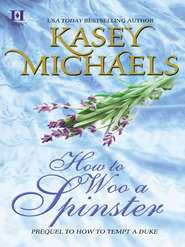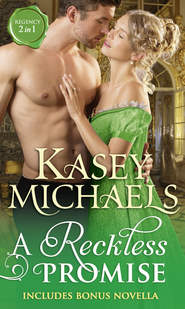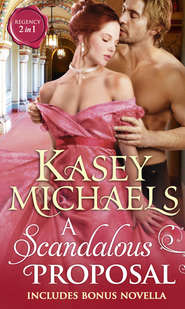По всем вопросам обращайтесь на: info@litportal.ru
(©) 2003-2025.
✖
How to Beguile a Beauty
Настройки чтения
Размер шрифта
Высота строк
Поля
Lydia looked from Rafe to Tanner, confusion clear in her eyes. “I shouldn’t wish to take you away from such an important speech, just to squire me. But, Tanner, there is no reason for you to sacrifice yourself in the role of chaperone, either. I have no crushing desire to attend the ball in any case.”
Tanner offered her his arm and walked her toward the foyer, throwing a silent thank you back over his shoulder at Rafe. “What? And miss out on those wonderful Gunther Ices I hear are to be served in the supper room? I’ve been looking forward to them all day, now that I think of it. And I also heard that her ladyship has commissioned an ice sculpture in the form of a pair of extremely long-necked swans. Ten feet high, I’m told. In this heat? We really should want to be there for the moment those long, delicate necks melt and the whole thing comes crashing down. Hugh Elliot has promised me he’ll be there, watching, just so that he can shout off with their heads at just the correct moment.”
Lydia looked up at him and smiled with those marvelous blue eyes of hers, clearly unaware that he immediately felt a figurative kick to his stomach. “You’re making that up as you go along, aren’t you, just so that I’ll agree to the evening?”
They walked outside, to his waiting curricle. “Ah, and that you won’t know unless you allow me to escort you to the ball, will you?”
“True. All right then, I accept your kind offer, sir. But there had better be swans.”
“I admit I can’t guarantee that, but at least I’m sure of the Gunther Ices. Lady Chalfont always has Gunther Ices, as they’re her husband’s favorite. Right after brandy, cigars, Faro banks and, rumor has it, a fiery redheaded opera dancer in Covent Garden. And here we are—up you go.”
Tanner vaulted around the rear of the curricle once Lydia was seated, and climbed up, taking the reins from the groom.
“Rafe informed me that your chaperone is suffering from the gout,” he said as they left Grosvenor Square for the short ride to Hyde Park. “And, as Nicole has left the city, I was thinking just now that you might miss her company at the ball.”
“I miss her company at all times,” Lydia corrected quietly. “But you’re correct.”
Tanner nodded, again, just as if he’d only this moment realized the problem, and the solution. “In that case, since my cousin is in town, and her chaperone is not suffering with the gout, what do you say I ask Jasmine if she wants to accompany us this evening, to bear you company now that Nicole is not here? I would not wish to have you feel alone in the ballroom.”
Lydia turned her head to look toward a knot of ladies just then crossing the street, heading for the entrance to the park. Was she intrigued by them, or just avoiding his gaze? “I’ve never met your cousin. But, yes, that would be very nice, I’m sure.”
If Lady Chalfont’s swans could be kept in close proximity to Lydia this evening, there would be no danger of their necks melting through. The sudden unexpected chill in Lydia’s voice was that evident, and strangely out of character. Lydia was never cross.
“Now I’ve upset you in some way,” Tanner said as he deftly eased his curricle into the line of coaches, phaetons and other showy equipages all jockeying for position on the broad sandy track that wound through the park.
She shifted on the plank seat, to face him. “Oh, I’m sorry, Tanner. I’m—well, let me just say that it has been a rather strange day. It’s not that I mean to be ungrateful. But it’s also so…well, so obvious. You’re being kind. Am I such a pitiful wreck, that people feel this need to be kind to me?”
“I wasn’t being—”
“Oh, but you were, and I really should thank you, even while in my heart I know I should not have to apologize for voicing my feelings in the matter,” Lydia interrupted, her smooth pale cheeks taking on a hint of color, of fire. “So, please, allow me to say what I feel. Everyone is so kind to me. Be careful around Lydia, they must tell each other, tiptoe if at all possible. Poor Lydia, now that Nicole has gone away. Poor Lydia, the bluestocking, the dull one, who only dances when Nicole’s card is already filled and the gentlemen hope to impress her by squiring her insipid, forgettable sister. Poor sad Lydia, still mourning her lost—”
She clamped her gloved hands to her mouth, her eyes now wide as saucers.
Tanner didn’t know if he should apologize, or cheer. “Lydia? Are you all right?”
She slowly lowered her hands, to reveal a small but growing smile. “My goodness. I think I’ve just had a tantrum.”
“Are you sure?” Tanner would have thought a tantrum involved a good deal more anger, some shouting, and possibly some general tossing and smashing of fragile china. But for a first effort, if that’s what it had been, she had done rather well. She certainly had his attention.
“I am, yes. And Nicole’s right. I do feel better. Tanner, since you say you are my friend, you will oblige me now by no longer treating me as if I should be packed up in cotton wool. Is that agreed? Wait, before you speak—and in turn, I will oblige you by not being such a…such a…well, whatever it is I was being that has had you all behaving as if I’m some delicate ice swan’s neck apt to melt and topple at any moment.”
Tanner felt a nearly overwhelming desire to pull her into his arms. But he was also aware that the opposite of coddling her in cotton wool was not an invitation for an all-out frontal assault and baring of his emotions.
“I’m sorry, Lydia, if we’ve all been tiptoeing around you. And, to prove it, I’ll ask you this time, and not tell you or attempt to cajole you—would you care to accompany my cousin and myself to Lady Chalfont’s ball this evening? Or would you much rather tell me to go find a pump and soak my head?”
“I would never say anything like that! At least I don’t think I would.” She then nodded her head twice, rather decisively. “Yes, thank you, I believe I should like very much attending the ball with you and Miss Harburton. And I’m certain I will enjoy meeting your cousin.” Then she gave him another smile, and another figurative kick to the gut. “But you think it was a good tantrum?”
“Tolerable, yes. You might need a little more practice before you’ve perfected it, but it was a good beginning.”
“I’m usually considered to be a good student. I’ll apply myself. Oh…someone is attempting to get your attention. Over there,” she said, pointing with her chin—how he delighted in the way she did that.
“Tanner Blake, it has been too long. How good to see you again,” the man called out, waving his hand in the air as he approached on horseback. “It was one thing to be long-ago chums, and to crack a few bottles with you in Paris a few years ago, but now that you’re the duke, I suppose I should take great care to cultivate your newly esteemed self.”
Tanner quickly took in the finely set-up grey stallion and the even more perfectly set-up gentleman in the saddle, still doing his best not to appear shocked at his friend’s sudden appearance. “Justin. Nobody told me you were in town. Did Vienna finally pall on you?”
Baron Justin Wilde, who had worn many hats during the last years in the fight against Bonaparte—many of them not known to any but the most highly-placed in the War Office—eased his mount around so that he was now riding alongside the curricle. The two men shook hands, no mean feat as both curricle and horse were still on the move.
Justin Wilde was now, as Tanner always remembered him to be, dressed in the first stare of fashion, the cut of his jacket accentuating the natural breadth of his shoulders, the buckskins molded to his strong thighs above high, close-fitting black Hessian boots sporting natty leather tassels and shined within an inch of their lives. But it was the lace at collar and cuffs that most firmly lifted him above the ordinary, as well as a face too handsome to allow anyone to feel threatened by him and his considerable muscles.
In fact, many would at first blush of meeting the Baron think him a smooth-speaking, faintly air-headed fop. They would look into those laughing green eyes beneath brows as dark as his boots and his hair, be disarmed by the frequent smile, and believe themselves in the company of a none-too-bright jewel of the ton. Which would be their mistake.
“I escaped Vienna nearly a month ago, slowly making my way home. Diplomacy can be boring, even when we’re carving up empires like bakers cutting a cake.” He half-stood in the stirrups as he tipped his curly-brimmed beaver at Lydia. “Forgive him, ma’am. The boy never did learn his manners. I am Justin Wilde, and you are the most delightful creature I’ve ever been privileged to see. Please tell me this scoundrel is only squiring you, and has no prior claim to your affections now that my heart hangs in the balance on your answer.”
Tanner’s laugh brought a small, hesitant smile to Lydia’s face. “Lady Lydia Daughtry, please forgive me for being forced to introduce to you Baron Justin Wilde. Soldier and statesman, wit and fool. And he plays all of those roles better than most. I suggest you avoid him at all costs.”
“Oh, foul, Tanner. Foul. You’re twice the fool I am, and so I tell everyone. Lady Lydia, again, I implore you. Tell me your heart is not as yet bespoken, most especially to an unnamed rogue bearing a rather canny resemblance to the gentleman now looking so uncomfortable beside you, else mine own heart will surely break.”
Tanner waited for Lydia’s answer, realizing that he had no idea what she would say. Yesterday, he would have known she’d be polite, rather shy, and most definitely exceedingly proper. But today? He looked at her curiously, his heart jumping when she revealed a small, rather wry smile that made him see, perhaps for the first time, a resemblance to her mischievous twin.
“I most seriously doubt my words hold such power, sir,” she said after a moment, “but if it eases your endangered heart at all, I will say that his Grace and I are friends out merely to enjoy the air and, of course, the present foolish company.”
Wilde swiftly removed his hat and pressed it to his chest in mock admiration. “My God, Tanner, she speaks in complete sentences. And without simpering or stuttering or feigning light-headedness at my crude attempts at flattery.” Once again he leaned his head forward, to look around Tanner. “Lady Lydia, please be so kind as to picture me figuratively at your feet. I had no idea beauty such as yours could exist, most especially in concert with a functioning mind.”
Tanner put out his arm, pushing Wilde back on his saddle even as he maneuvered the reins and the curricle moved forward slowly, thanks to the crush of other vehicles. “You should take yourself back to Vienna, Justin, if your opinion of London ladies is so poor.”
“Nonsense, Tanner. My opinion of all ladies is that they are delightful creatures. As long as one isn’t so unfortunate as to have to engage them in conversation for more than a few minutes, of course. Which, fortunately, I usually don’t. But Lady Lydia seems to be a wonderful exception to the rule.”
Now it seemed to be Lydia’s turn to push—politely—Tanner back on his seat as she leaned forward to question the Baron. “Exception though you have deemed me, I feel I must now ask you a question. Are you then a misogynist, sir? Or perhaps a misanthrope, and your distaste extends to all creatures who are not you? Are you Alceste?”
Tanner now sat back on the bench seat all by himself, without further direction from either Wilde or Lydia. He figured it was safer.
“Alceste, you say? That woeful cynic? Then you are familiar with Molière and his masterpiece, Le Misanthrope? Tanner, did you hear that? Wait, wait, this can’t be. Lady Lydia, indulge me by completing this line. He’s a wonderful talker, who has the art…?”
Tanner laughed out loud. “God’s teeth, Justin, you’d quiz her?”
“No, no, it’s all right. Shall I?” Lydia looked to Tanner, who merely nodded. “Very well, then. He’s a wonderful talker, who has the art of telling you nothing in a great harangue.”
“Ha! I can see why that line is one of your favorites, Justin. Sounds just like you. Are we done now? I brought Lady Lydia here to see the sights, not to amuse you. Although I’ll admit to being quite well amused myself.”
“I’ll leave you now, yes,” Wilde said, his considering gaze still on Lydia, who seemed to have suddenly remembered that she was the shy twin, the one who never put herself forward. “But perhaps we can meet again later, Tanner? It has been too long.”
Tanner agreed, because he did truly enjoy Justin Wilde. He told him that he and Lydia would be attending Lady Chalfont’s ball later in the evening, and then finally watched as Wilde rode off, probably already planning on whom he would next harass with his perfect—and yet unexpected, almost bizarrely so—presence.
“What a strange man,” Lydia said as Tanner moved the curricle forward only a few feet, the crush of equipages now reaching a multitude on this rare sunny afternoon. “Does he really think women are so…useless?”
“I’d say I wouldn’t know, except that I like the man, and feel he may have made a rather odd first impression. Justin was once married to an extraordinarily beautiful young woman, Lydia, and it ended badly. He has told me that he chose her for her beauty, which, again, according to him, is a mistake made too often by vain and foolish gentlemen.”
“I believe that particular mistaken and short-sighted conclusion is shared by both genders.”











